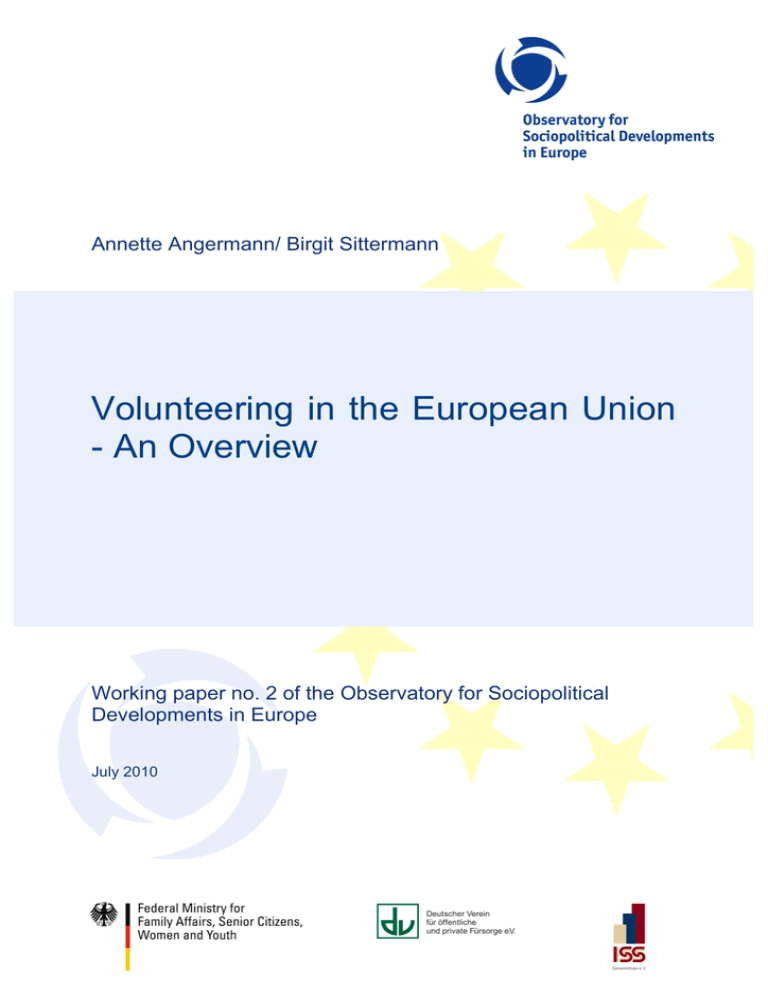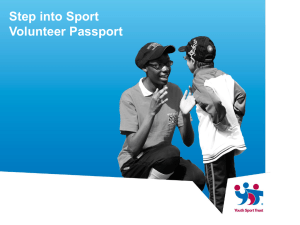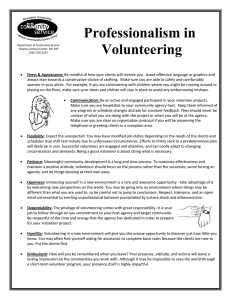
Annette Angermann/ Birgit Sittermann
Volunteering in the European Union
- An Overview
Working paper no. 2 of the Observatory for Sociopolitical
Developments in Europe
July 2010
EDITORIAL INFORMATION
Published by:
Institut für Sozialarbeit und Sozialpädagogik e.V. –
Institute for Social Work and Social Education (ISS)
Office address: Zeilweg 42, 60439 Frankfurt a. M. – Germany
Postal address: Postfach 50 01 51, 60391 Frankfurt a. M. – Germany
Phone: +49 (0)69 - 95 78 9-0, Fax: +49 (0)69 - 95 789 190
Internet: http://www.iss-ffm.de
This is a publication of the “Observatory for Sociopolitical Developments in Europe”. It was
produced with the support of the German Federal Ministry for Family Affairs, Senior Citizens,
Women and Youth (BMFSFJ). It is distributed free of charge and is not intended for sale.
This publication does not necessarily reflect the opinions of the German federal government.
The publisher and/or the authors of individual articles bear responsibility for its content.
All rights reserved. Reprints or comparable use, including of extracts, are permissible only
with prior written authorisation.
The Observatory is a project funded by the German Federal Ministry for Family Affairs,
Senior Citizens, Women and Youth (BMFSFJ), D-11018 Berlin.
The Observatory’s website: http://www.beobachtungsstelle-gesellschaftspolitik.eu.
http://www.beobachtungsstelle-gesellschaftspolitik.eu.
The institutions operating the Observatory are:
Deutscher Verein für öffentliche und private Fürsorge e.V.
German Association for Public and Private Welfare (DV)
Michaelkirchstrasse 17/18, 10179 Berlin - Germany
Phone: +49 30-62980-0, Fax: +49 30-62980-140
Internet: http://www.deutscher-verein.de
Institut für Sozialarbeit und Sozialpädagogik e.V. Institute for Social Work and Social Education (ISS)
Office address: Zeilweg 42, 60439 Frankfurt a. M. - Germany
Postal address: Postfach 50 01 51, D-60391 Frankfurt a. M.
Phone:+49 (0)69 - 95 78 9-0, Fax: +49 (0)69 - 95 789 190
Internet: http://www.iss-ffm.de
Authors:
Annette Angermann (angermann@deutscher-verein.de)
Birgit Sittermann (birgit.sittermann@iss-ffm.de)
Graphic Design:
www.avitamin.de
Circulation:
This publication is available only as a PDF file from http://www.sociopolitical-observatory.eu.
Date of Publication:
Publication of the original German version: July 2010
Publication of the translated English version: April 2011
Table of contents
1
Introduction .................................................................................................................... 2
1.1
Definition of volunteering ......................................................................................... 2
1.2
How much volunteering is there in Europe? An overview of volunteering studies .... 4
2
EU actors dealing with volunteering ............................................................................... 7
3
EU programmes on volunteering .................................................................................... 9
4
How is volunteering discussed on the European level? ................................................ 11
5
European Year of Volunteering Promoting Active Citizenship (2011) ........................... 13
6
Bibliography ................................................................................................................. 15
1
1
Introduction
The decision in favour of the European Year of Voluntary Activities Promoting Active
Citizenship (2011) underscores that volunteering is also an issue at the EU level. This paper
provides an overview of who in the EU deals with volunteering (chapter 2) and which
programmes and thematic discussions there are on this subject (chapter 3 and 4). Finally,
the paper concludes with a glance at the European Year 2011 (chapter 5). At the beginning,
the authors present definitions of volunteering and offer an overview of the divergent
volunteering rates.
1.1
Definition of volunteering
What does volunteering actually mean? Watering the neighbour’s flowers when he or she is
on holiday, membership in a rabbit breeding association, being an unpaid children’s football
coach? What about participating in a demonstration, caring for your own parents or donating
money to a charity?
All these activities are proof that someone is voluntarily active. The question of whether
volunteering is the right term ultimately depends on the definition that is used. There is no
uniform definition, however. Furthermore, in the German-speaking regions several different
terms are used for volunteering. For example, there is (Braun 2002: 54):
• Bürgerschaftliches Engagement (civic participation / civic engagement)
• Freiwilliges Engagement (voluntary participation / voluntary engagement)
• Zivilgesellschaftliches Engagement (engagement of civil society / civil participation)
• Zivilengagement (civil participation / civil engagement)
• Ehrenamt (honorary position)
• Freiwilligenarbeit (volunteer work)
Each term is connected with a certain (philosophical / from social science deriving) school of
thought and thus also with certain connotations (Anheier / Toepler 2003: 21-23). A better
option is to use characteristic features for a definition, as the Committee of Inquiry “Future of
Civc Engagement” of the German Bundestag (German Parliament) did (EnqueteKommission „Zukunft des bürgerschaftlichen Engagements“ des Deutschen Bundestages
2002: 861):
“Civic engagement in this sense is:
•
voluntary,
•
not focused on material profit,
•
oriented on the common good,
•
takes place in public or in the public sphere and
•
is usually performed collectively/ cooperatively.”
2
At the European level, the Council decision on the European Year of Voluntary Activities
Promoting Active Citizenship (2011) offers the most recent definition of volunteering. The
document uses the terms civic participation, volunteering and voluntary activities. (European
Council 2009 / 2010: Preamble section 5; bold font for emphasis added to original version) 2:
“Having due regard to the particularities of the situation in each Member State and all forms
of volunteering, the term "voluntary activities" refers to all types of voluntary activity,
whether formal, non-formal or informal which are undertaken of a person’s own free
will, choice and motivation, and is without concern for financial gain. They benefit the
individual volunteer, communities and society as a whole. They are also a vehicle for
individuals
and
associations
to
address
human,
social,
intergenerational
or
environmental needs and concerns, and are often carried out in support of a nonprofit organisation or community-based initiative. Voluntary activities do not replace
professional, paid employment opportunities but add value to society.”
An unusual aspect of this definition is dividing volunteer work into formal, non-formal and
informal categories. The current literature usually contrasts formal volunteering on the one
hand to non-formal or informal volunteering on the other. Formal volunteering is the generic
term for voluntary activities that take place in organised structures, e.g. the assumption of a
volunteer position (such as lay judges) or participating as a youth group leader in a sport
association. The terms non-formal or informal volunteering are usually used as synonyms.
They relate to “unorganised” forms of volunteering such as e.g. helping neighbours (BMFSFJ
2009: 8). The text of the Council’s Decision does not make it clear how these three forms are
differentiated from each other. The list of activity areas shows only some examples, thus, for
instance, the cultural area is missing.
In the daily discussion, a precise clarification of the definition is not always necessary, since
terms such as civic participation and voluntary work can be understood in a very broad
manner. In the concrete case, it is however necessary to ask whether assisting neighbours
or political activities are included. This is even more relevant when a discussion takes place
in the European / international context, since every country has its own volunteering tradition.
There are, for instance, significant differences between the forms of volunteering and what is
understood as volunteering in general.
For post-Socialist member states in Central and Eastern Europe, it is necessary to consider
that after the political changes, associations and organisations for participating and
volunteering had to be newly founded. Furthermore, a new understanding of volunteering
1
Braun 2002 and the 2002 Committee of Inquiry of the German Bundestag “Future of Civic Participation” offer a
summary of various terms and definitions: 57f. and 73ff.
2
The study “Volunteering in the European Union” offers an overview of other internationally used definitions (GHK
2010: 49f.).
3
had to develop since civic participation such as membership in youth organisations or
involvement in political celebrations was often not really voluntary but an expected duty.
(Zimmer / Priller 2004, GHK 2010: 48).
Another difference in the understanding of volunteering is the question of whether or not
informal volunteering such as helping a neighbour counts. In Austria, this is the case; in
Switzerland, donating money or resources also counts (BMFSFJ 2009). The term
volunteering in the Netherlands includes political participation, voluntary work, helping small
children and caring for dependants (Vogelwiesche / Sporket 2008: 11). Informal volunteering
in Germany usually does not count as civic engagement, and in France, this is also not
included in the term volunteering (BMFSFJ 2009).
1.2
How much volunteering is there in Europe? An overview of
volunteering studies
The differences in the understanding of volunteering are also reflected in the studies that
examine how many citizens can be described as volunteers. Different results regarding the
volunteering figures – whether in national studies or in international comparative studies –
are due to the different concepts of volunteering. Consequently, it has to be clarified whether
formal and informal volunteering was included or only formal volunteering. Another question
is whether membership in an association is considered volunteering or whether the
assumption of concrete responsibilities in an organisation is necessary for the activity to
qualify as civic participation. In the evaluation of the volunteer rate, i.e. the number of people
volunteering as a percentage of a country’s entire population or a group of the population, it
is always important to consider the cultural background. If volunteering for the family takes
priority in a country, this would explain, for example, why these people have less time for
formal volunteering in organisations.
The current figures on citizens’ volunteering behaviour demonstrate national differences.
Accordingly, the “European Social Reality“ survey (Eurobarometer) (European Commission
2007a), published in February 2007, came to the conclusion that Austria (60%), the
Netherlands (55%) and Sweden (53%) are the countries where most people volunteer. The
Lithuanians (11%) and Portuguese (12%) volunteer the least. The study SHARE (Survey on
Health, Ageing and Retirement in Europe), which among others examines the volunteering
behaviour of people over the age of 50 (Hank / Erlinghagen 2005), stresses that there are
national differences in the volunteering figures.
In a comparison of the two studies, it is important to remember that the Eurobarometer
survey includes active membership in an organisation, while the SHARE study explicitly does
4
not ask about membership, but rather only includes voluntary activities in the month before
the survey. Furthermore, the age of the respondents differs: people above the age of 15
were questioned in the Eurobarometer survey, while SHARE concentrated on people over
50.
5
A comparison of volunteering figures from current studies (selection of some
countries)
Eurobarometer 2007
The
question
membership
and
in
about
Survey of Health, Ageing
and
Retirement
in
active
Europe (SHARE) 2005
organisations
volunteer
work
was
The question about volunteer
work in the month before the
answered with Yes:
survey was answered with Yes:
(Age of the respondents: 15
(Age of the respondents: 50
and older)
and older)
Germany (volunteer rate 52 %
in the German volunteer
survey
2004
for
comparison: 36%)
34 %
Italy
9-14 %
3
4-11 %
Lithuania
11 %
Not recorded
Netherlands
55 %
8-26 %
Spain
18 %
2-3 %
Average of the surveyed 34 % (EU25)
countries
(arithmetic
average)
3
20 % (11 surveyed countries in
Europe)
These differences in the existing studies with regard to the procedure and the underlying
definitions make it more difficult to draw a uniform and empirically precise picture of the
volunteering behaviour of Europeans, according to a conclusion of the current EUcommissioned study “Volunteering in the European Union" (GHK 2010: 42). In a summary of
the available European and national studies, this examination comes to the conclusion that
only Sweden and the Netherlands are described in all the studies as member states with a
very high volunteer rate (above 40%). The analysed studies are also in agreement that
Bulgaria, Lithuania, Poland, Portugal, Romania and Spain are member states with a
relatively low volunteer rate (less than 20 % are volunteering).
On the basis of the available studies, the study “Volunteering in the European Union”
mentions a volunteer rate for all of Europe amounting to 22 to 23% of everyone over 15
years of age. However, this is not a statistically precise figure, but rather on account of the
data situation, the best possible indication of the European volunteer rate (GHK 2010: 57). A
collective general trend in Europe is however that the number of volunteers has risen in the
last ten years (GHK 2010: 66).
3
The inclusion of a range is due to the fact that the volunteering figures were broken down according to age
groups (50-64; 65-74; 75+) and these vary depending on the age group.
6
2
EU actors dealing with volunteering
In the European Union, various actors are dealing with volunteering. In the following, all
relevant actors responsible for volunteering and their competences in this field are listed.
European Commission
After the European Parliament election in 2009 and the resulting re-organisation of the
European Commission, the responsibility for volunteering has been assumed by the VicePresident of the European Commission, Viviane Reding, Commissioner for Justice,
Fundamental Rights and Citizenship (prior to this, the unit “Citizen’s Policy; Europe for
Citizens” of the Directorate-General for “Culture and Education” was responsible).
4
European Parliament
• Volunteering has not been established as a policy field of its own right on the
European level. However, since the first initiative of the European Parliament to
create
a
European
volunteering
strategy
(European
Parliament
1983 5),
volunteering is at least a side issue in several other policy fields. This primarily
includes the areas of youth, sport, senior citizens and education as well as active
EU citizenship. Consequently, volunteering is reflected in various policy fields and
is therefore a horizontal issue.
• Since 2006, there has been an intergroup on volunteering within the European
parliament (legislative period 2004-2010).
• On 09 April 2008, Marian Harkin (MEP) together with other MEPs submitted a written
declaration in favour of declaring 2011 the European Year of Volunteering
(0030/2008). (MEP Marian Harkin is a member of the Employment and Social
Affairs Committee and was elected to be the “European Parliament Draftswoman to
an Opinion on the European Year of Volunteering” in December 2009.) 6
• Likewise, in 2008, the European Parliament issues a statement highlighting
volunteering as a contribution to economic and social cohesion (Marian Harkin et.
al. 2007/2149 INI).
• On 13 April 2010, the “Volunteering Interest Group” of the European Parliament was
officially set up. This group is an informal cross-party committee that was founded
4
http://ec.europa.eu/commission_2010-2014/reding/citizenship/index_en.htm#
Resolution on Volunteering(11525/83)
6
http://www.marianharkin.com/index.php?id=48
5
7
at the initiative of Marian Harkin. The interest group monitors the implementation of
the European Year 2011 on the part of the European Parliament.
Council of the European Union
• In 2004, the Council determines the common objectives for voluntary activities of
young people (13996/04).
• Also in 2004, the Council of the European Union publishes a directive on the
conditions of admission of third-country nationals for the purpose of voluntary
service (2004/114/EC).
• In 2006, the Council publishes a resolution on the recognition of the value of nonformal and informal learning within the European youth field (2006/C168/01).
• In 2007, the Council determines the implementation of the common objectives for
voluntary activities of young people (14427/07). (Held 2010)
European Economic and Social Committee (EESC)
• In 2006, the EESC made a statement on “voluntary activity,” its role in European
society and its impact (1575/2006) (Held 2010).
• The EESC awards a “Prize for Organised Civil Society” (for the third time in 2009),
with which the EESC honours outstanding examples of civic participation in the
European Union.
7
7
http://www.eesc.europa.eu/?i=portal.en.organised-civil-society-prize-2009.
8
3
EU programmes on volunteering
There are numerous programmes on volunteering at EU-level. In the following, the most
important programmes on the European level are outlined.
Europe for citizens (2007-2013)
The programme Europe for citizens 8 was established by the decision of the Council of the
European Union and the European Parliament (in charge of programme guideline: European
Commission) (1904/2006/EC) and is divided into four areas that facilitate transnational
experiences for citizens:
• Active Citizens (campaign 1) supports activities concerning town twinning and other
direct forms of citizen participation
• Active Civil Society in Europe (campaign 2) focuses on civil-society organisations
(operating cost subsidies or project support)
• Together for Europe (campaign 3) includes campaigns with great publicity, studies
and information instruments
• Active European Remembrance (campaign 4) supports projects for the maintenance
of important memorial sites
The Golden Star Award honours town twinning projects and civil society projects as well as
memorial projects that were supported by the programme Europe for citizens.
The programme is the successor of the campaign programme for Active European
Citizenship 2004-2006 (Held 2010).
8
http://eacea.ec.europa.eu/citizenship/programme/about_citizenship_en.php
9
Youth in Action (2007-2013)
Youth in Action 9 is an EU programme established by a decision of the European Parliament
and the Council of the European Union (1719/2006/EC) for the funding of (out-of-school)
activities for young people in Europe. It is implemented by 33 national agencies in 31
European countries that work together across borders. The programme is divided into five
support possibilities:
• Youth for Europe (Action 1) promotes European youth meetings.
• European Voluntary Service (Action 2) enables young people and young adults to
volunteer in another country. Afterwards, the youths' volunteer work is certified in
their Youthpass and their abilities and skills acquired during the voluntary service
are recorded.
• Youth in the World (Action 3) promotes projects with neighbouring partner countries.
• Youth Support Systems (Action 4) supports organisations that do European youth
work (e.g. through operating cost subsidies).
• Support for European Co-operation in the Youth Field (Action 5) promotes e.g.
transnational youth seminars.
The programme has existed since 1998, however in a modified form (Held 2010).
Programme for Life-long Learning (LLP)
This programme is divided into various sub-programmes that are based on the life and
learning situation in question, whereby the action programme GRUNDTVIG 10 is especially
interesting:
• GRUNDTVIG is focused on all areas of adult education and promotes exchanges,
learning partnerships, volunteer projects of older people, etc.
9
http://www.eu-info.de/foerderprogramme/bildung-jugend/Jugend-in-Aktion/ ;
http://eacea.ec.europa.eu/youth/programme/about_youth_en.php
10
http://www.lebenslanges-lernen.eu/grundtvig_5.html; http://ec.europa.eu/education/lifelong-learningprogramme/doc86_en.htm
10
4
How is volunteering discussed on the European level?
After the overview of the various EU programmes that deal with volunteering, we will provide
a summary of the aspects of volunteering that are addressed on the EU level.
Since when has volunteering been a subject on the European level?
For the first time, volunteering was mentioned on EU level in a resolution of the European
Parliament in 1983 (Held 2010: 429). The first action in this policy field was the 1996
introduction of the European Voluntary Service in 1996 (Directorate-General for Education
and Culture 2006).
The issue of volunteering
Two aspects of volunteering are particulary important on the European level. On the one
hand, volunteering is considered as a possibility to promote life-long learning; on the other
hand, an important contribution to the promotion of active citizenship is ascribed to civic
participation. These positive aspects of volunteering are reflected in the European Voluntary
Service, in the Grundtvig voluntary service for older people and in the programme Europe for
citizens. The aspects are also listed by the European Council in the reason it gives for
declaring 2011 the European Year of Voluntary Activities Promoting Active Citizenship
(European Council 2009 /2010: Preamble).
Special target groups in the European promotion of volunteering
Concerning volunteering, young people in particular are addressed on the European level:
the European Voluntary Service focuses on 18-30 year olds. People over 50 can then take
part in the programme “Senior Volunteering Projects” (subprogramme of the Grundtvig
programme for life-long learning). In the preamble of the Council decision for the European
Year of Volunteering 2011, reference is made to the differences in the volunteering of men
and women, which could be raised and addressed through the European Year 2011.
Women, for instance, are particularly underrepresented in leadership positions in the
voluntary sector (European Council 2009 / 2010: Preamble Section 16). In this area, the
promotion of women can make sense, while in other fields of volunteering; the promotion of
men could bring benefits.
Particularly recognised fields for volunteering
European policies identify both certain target groups and specific fields that are particularly
distinguished by volunteer work. This applies to the area of sport and sport organisations.
The structures of sport based on voluntary activities are emphasised in the White Paper on
11
Sport (European Commission 2007b), and in the Treaty on the Functioning of the European
Union (Art. 165). Volunteering in sport also represents a focal point of the study of
“Volunteering in the European Union” (GHK 2010), which was published in 2010.
Volunteering is also highlighted in multiple documents as a particular feature of Social
Services (European Commission 2006: 7, European Commission 2007b: Section 2.3).
12
5
European Year of Volunteering Promoting Active
Citizenship (2011)
NGO activities
An alliance of various NGOs (The EYV 2011 Alliance) campaigned to declare the year 2011
the European Year of Volunteering and it will also participate in the planning and execution of
the year after the decision for the year 2011. The leading organisation in this alliance was
and is the European Volunteer Centre (das Europäische Freiwilligenzentrum, Centre
Européen du Volontariat, CEV). The alliance consists of 20 European umbrella
organisations.
The reason for the campaign for the year 2011 was the ten-year anniversary of the Volunteer
Year 2001, which was proclaimed by the United Nations, but was also implemented in the
EU and member states.
The Alliance for 2011 has a website on the subject and also conducted the official
competition for the logo and slogan.
The European Commission selected this logo:
The official slogan for the year is: Volunteer! Make a Difference! 11
CEV operates as the co-ordinating body for the European Year on the European level.
Responsibilities of the Commission
In the European Commission, Unit A4 of the Directorate-General for Communication is
responsible for the European Year of Voluntary Activities Promoting Active Citizenship. 12
11
http://www.eyv2011.eu/PublicImageVoting.asp
13
Responsibilities on the national level
The EU member states have set up national coordinating bodies that are responsible for the
execution of the year. This list is available on the website of the European Commission for
the European Year 2011: http://ec.europa.eu/citizenship/focus/focus840_en.htm
Goals for the European Year 2011
The official goals, which are presented in the Council decision for the European Year 2011
place a focus on the promotion of volunteering:
1.
To work towards an enabling environment for volunteering in the EU
2.
To empower organisers of voluntary activities to improve the quality of voluntary
activities
3.
To recognise voluntary activities
4.
To Raise Awareness for the value and importance of volunteering
You will find the wording of the Council decision with more information on the goals and the
implementation of the year in the original document of the Council decision. (Council decision
of 27 November 2009 on the European Year of Voluntary Activities Promoting Active
Citizenship (2011) (2010/37/EC), published in the Official journal on 22 January 2010.)
12
http://ec.europa.eu/staffdir/plsql/gsys_fonct.properties?pLang=EN&pSernum=6366&pUnite=47251
14
6
Bibliography
Anheier, Helmut K. / Stefan Toepler (2003): Bürgerschaftliches Engagement zur Stärkung
der Zivilgesellschaft im internationalen Vergleich. In: Enquete-Kommission „Zukunft des
bürgerschaftlichen Engagements“ des Deutschen Bundestages (Ed.): Bürgerschaftliches
Engagement im internationalen Vergleich. = Schriftenreihe der Enquete-Kommission
„Zukunft des bürgerschaftlichen Engagements“ des Deutschen Bundestages Band 11.
Opladen, Leske und Budrich, pp.13-56.
Braun,
Sebastian
(2002):
Begriffsbestimmungen,
Dimensionen
und
Differenzierungskriterien von Bürgerschaftlichem Engagement. In: Enquete-Kommission
„Zukunft des bürgerschaftlichen Engagements“ des Deutschen Bundestages (Ed.):
Bürgerschaftliches Engagement und Zivilgesellschaft. = Schriftenreihe der EnqueteKommission „Zukunft des bürgerschaftlichen Engagement“ des Deutschen Bundestages
Band 1. Opladen, Leske und Budrich, pp. 55-72.
BMFSFJ (Bundesministerium für Familie, Senioren, Frauen und Jugend) (2009): Monitor
Engagement Ausgabe Nr. 1 Nationaler und internationaler Stand der Forschung,
http://www.bmfsfj.de/BMFSFJ/Service/Publikationen/publikationen.html (Retrieved on 15
April 2010).
Directorate-General Education and Culture (European Commission) (2006): 10 years of
solidarity and active citizenship. European Voluntary Service 1996-2006,
http://ec.europa.eu/youth/archive/evs2006/download/EVS_History.pdf (Retrieved on 15
April 2010).
Enquete-Kommission „Zukunft des bürgerschaftlichen Engagements“ des Deutschen
Bundestages (2002): Bericht. Bürgerschaftliches Engagement: auf dem Weg in eine
zukunftsfähige Bürgergesellschaft = Schriftenreihe der Enquete-Kommission „Zukunft des
bürgerschaftlichen Engagement“ des Deutschen Bundestages Band 4. Identical to
Bundestagsdrucksache (i.e. Official Document of the German Parliament) 14/8900 of 3
June 2002. Opladen, Leske und Budrich.
European Commission (2006): Implementing the Community Lisbon programme. Social
services of general interest in the European Union. Luxembourg, Office for Official
Publications of the European Communities.
European Commission (2007a): European Social Reality. Special Eurobarometer 273
http://ec.europa.eu/public_opinion/archives/ebs/ebs_273_en.pdf
(Retrieved
on
01
December 2009).
European Commission (2007b): White paper on Sport (COM (2007)391final).
European Council (2008): Consolidated Version of the Treaty on the Functioning of the
European Union of 30 April 2008. Published in the Official Journal of the European Union
on 09 May 2008.
European Council (2009/2010): Council Decision of 27 November 2009 on the European
Year of Voluntary Activities Promoting Active Citizenship (2011) (2010/37/EC). Published
in the Official Journal of the European Union on 22 January 2010.
GHK (2010): Volunteering in the European Union. Study on behalf of the European
Commission (Directorate-General Education and Culture). Published on 17 February
2010.
15
Hank, Karsten / Marcel Erlinghagen (2005): Volunteer Work. In: Health, Ageing and
Retirement in Europe. First Results from the Survey of Health, Ageing and Retirement in
Europe,
pp.
259-264,
http://www.shareproject.org/t3/share/uploads/tx_sharepublications/SHARE_FirstResultsBookWave1.pdf
(Retrieved on 01.12.2009).
Held, Markus (2010): Engagementpolitik der EU- Flickwerk oder Strategie? In: Olk, Thomas
/ Klein, Ansgar / Birger Hartnuß (Eds.): Engagementpolitik. Die Entwicklung der
Zivilgesellschaft als politische Aufgabe. Wiesbaden, VS Verlag für Sozialwissenschaften,
pp. 407-436.
Vogelwiesche, Uta / Britta Sporket (2008): Strategien zur Stärkung des bürgerschaftlichen
Engagements älterer Menschen in Deutschland und den Niederlanden. Kurzexpertise im
Auftrag
des
BMFSFJ,
http://www.engagement-conference.info/resources/D-NLExpertise.pdf (Retrieved on 21 April 2010).
Zimmer, Annette / Eckhard Priller (Eds.) (2004): Future of Civil Society. Making Central
European
Nonprofit-Organizations
Work.
Wiesbaden,
VS
Verlag
für
Sozialwissenschaften.
16








